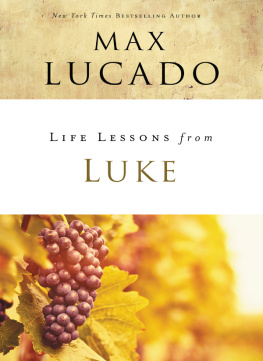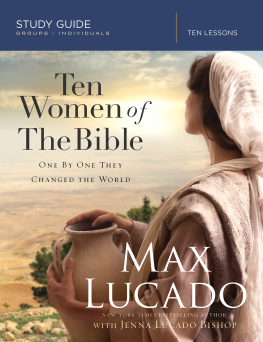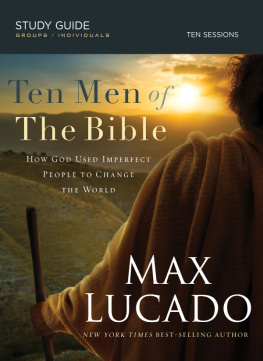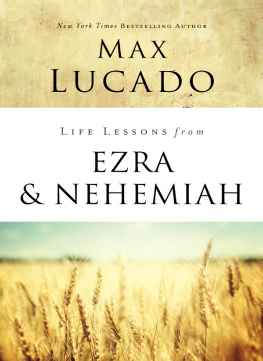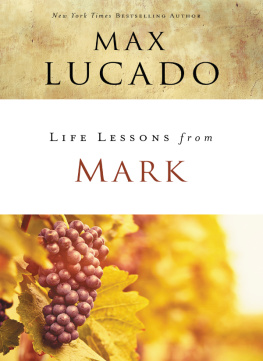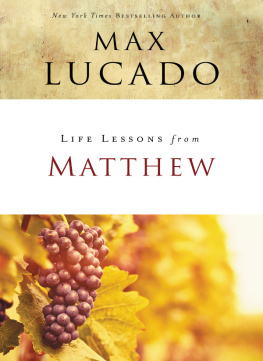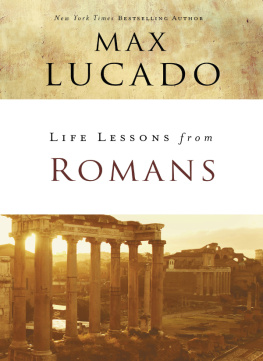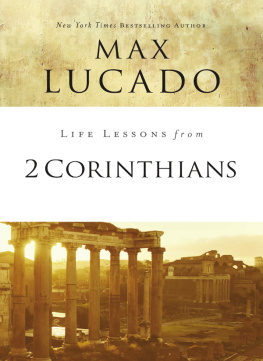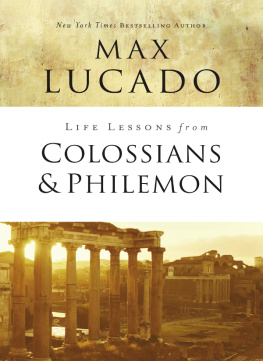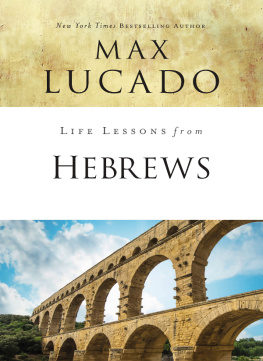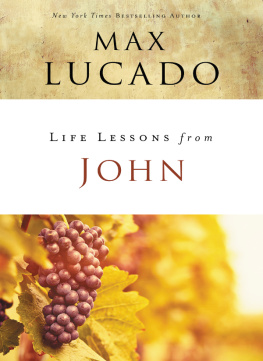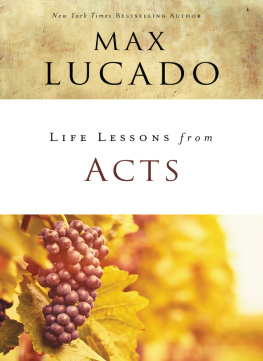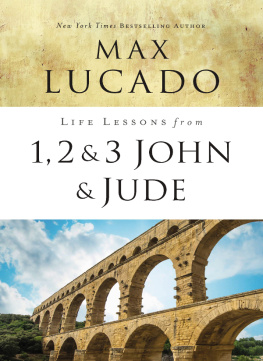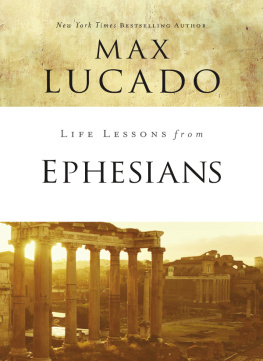Life Lessons from Luke
2018 by Max Lucado
All rights reserved. No portion of this book may be reproduced, stored in a retrieval system, or transmitted in any form or by any meanselectronic, mechanical, photocopy, recording, scanning, or otherexcept for brief quotations in critical reviews or articles, without the prior written permission of the publisher.
Published in Nashville, Tennessee, by Thomas Nelson. Thomas Nelson is a registered trademark of HarperCollins Christian Publishing, Inc.
Produced with the assistance of the Livingstone Corporation (www.livingstonecorp.com). Project staff includes Jake Barton, Joel Bartlett, Andy Culbertson, Mary Horner Collins, and Will Reaves.
Editor: Neil Wilson
All Scripture quotations, unless otherwise indicated, are taken from The Holy Bible, New International Version, NIV. Copyright 1973, 1978, 1984, 2011 by Biblica, Inc. Used by permission. All rights reserved worldwide.
Scripture quotations marked NKJV are taken from the New King James Version. Copyright 1982 by Thomas Nelson. Used by permission. All rights reserved.
Material for the Inspiration sections taken from the following books:
And the Angels Were Silent. Copyright 2004 by Max Lucado. Thomas Nelson, a registered trademark of HarperCollins Christian Publishing, Inc., Nashville, Tennessee.
Before Amen. Copyright 2014 by Max Lucado. Thomas Nelson, a registered trademark of HarperCollins Christian Publishing, Inc., Nashville, Tennessee.
God Came Near. Copyright 2004 by Max Lucado. Thomas Nelson, a registered trademark of HarperCollins Christian Publishing, Inc., Nashville, Tennessee.
The Great House of God. Copyright 1997 by Max Lucado. Thomas Nelson, a registered trademark of HarperCollins Christian Publishing, Inc., Nashville, Tennessee.
He Still Moves Stones. Copyright 1993 by Max Lucado. Thomas Nelson, a registered trademark of HarperCollins Christian Publishing, Inc., Nashville, Tennessee.
Its Not About Me. Copyright 2004 by Max Lucado. Thomas Nelson, a registered trademark of HarperCollins Christian Publishing, Inc., Nashville, Tennessee.
Next Door Savior. Copyright 2003 by Max Lucado. Thomas Nelson, a registered trademark of HarperCollins Christian Publishing, Inc., Nashville, Tennessee.
Shaped by God (previously published as On the Anvil). Copyright 2001 by Max Lucado. Tyndale House Publishers, Carol Stream, Illinois.
Six Hours One Friday. Copyright 2004 by Max Lucado. Thomas Nelson, a registered trademark of HarperCollins Christian Publishing, Inc., Nashville, Tennessee.
Thomas Nelson titles may be purchased in bulk for educational, business, fundraising, or sales promotional use. For information, please e-mail SpecialMarkets@ThomasNelson.com.
ISBN 978-0-310-08634-5
ISBN 978-0-310-08635-2 (eBook)
First Printing December 2017
Information about External Hyperlinks in this ebook
Please note that footnotes in this ebook may contain hyperlinks to external websites as part of bibliographic citations. These hyperlinks have not been activated by the publisher, who cannot verify the accuracy of these links beyond the date of publication.
In this ebook edition, please use your devices note-taking function to record your thoughts wherever you see the bracketed instructions [Your Notes] or [Your Response Here]. Use your devices highlighting function to record your response whenever you are asked to checkmark, circle, underline, or otherwise indicate your answer(s).
CONTENTS
T he Bible is a peculiar book. Words crafted in another language. Deeds done in a distant era. Events recorded in a far-off land. Counsel offered to a foreign people. It is a peculiar book.
Its surprising that anyone reads it. Its too old. Some of its writings date back 5,000 years. Its too bizarre. The book speaks of incredible floods, fires, earthquakes, and people with supernatural abilities. Its too radical. The Bible calls for undying devotion to a carpenter who called himself Gods Son.
Logic says this book shouldnt survive. Too old, too bizarre, too radical.
The Bible has been banned, burned, scoffed, and ridiculed. Scholars have mocked it as foolish. Kings have branded it as illegal. A thousand times over the grave has been dug and the dirge has begun, but somehow the Bible never stays in the grave. Not only has it survived, but it has also thrived. It is the single most popular book in all of history. It has been the bestselling book in the world for years!
There is no way on earth to explain it. Which perhaps is the only explanation. For the Bibles durability is not found on earth but in heaven. The millions who have tested its claims and claimed its promises know there is but one answer: the Bible is Gods book and Gods voice.
As you read it, you would be wise to give some thought to two questions: What is the purpose of the Bible? and How do I study the Bible? Time spent reflecting on these two issues will greatly enhance your Bible study.
What is the purpose of the Bible?
Let the Bible itself answer that question: From infancy you have known the Holy Scriptures, which are able to make you wise for salvation through faith in Christ Jesus (2 Timothy 3:15).
The purpose of the Bible? Salvation. Gods highest passion is to get his children home. His book, the Bible, describes his plan of salvation. The purpose of the Bible is to proclaim Gods plan and passion to save his children.
This is the reason why this book has endured through the centuries. It dares to tackle the toughest questions about life: Where do I go after I die? Is there a God? What do I do with my fears? The Bible is the treasure map that leads to Gods highest treasureeternal life.
But how do you study the Bible? Countless copies of Scripture sit unread on bookshelves and nightstands simply because people dont know how to read it. What can you do to make the Bible real in your life?
The clearest answer is found in the words of Jesus: Ask and it will be given to you; seek and you will find; knock and the door will be opened to you (Matthew 7:7).
The first step in understanding the Bible is asking God to help you. Your should read it prayerfully. If anyone understands Gods Word, it is because of God and not the reader.
The Advocate, the Holy Spirit, whom the Father will send in my name, will teach you all things and will remind you of everything I have said to you (John 14:26).
Before reading the Bible, pray and invite God to speak to you. Dont go to Scripture looking for your idea, but go searching for his.
Not only should you read the Bible prayerfully, but you should also read it carefully. Seek and you will find is the pledge. The Bible is not a newspaper to be skimmed but rather a mine to be quarried. If you look for it as for silver and search for it as for hidden treasure, then you will understand the fear of the L ORD and find the knowledge of God (Proverbs 2:45).
Any worthy find requires effort. The Bible is no exception. To understand the Bible, you dont have to be brilliant, but you must be willing to roll up your sleeves and search.
Do your best to present yourself to God as one approved, a worker who does not need to be ashamed and who correctly handles the word of truth (2 Timothy 2:15).
Heres a practical point. Study the Bible a bit at a time. Hunger is not satisfied by eating twenty-one meals in one sitting once a week. The body needs a steady diet to remain strong. So does the soul. When God sent food to his people in the wilderness, he didnt provide loaves already made. Instead, he sent them manna in the shape of

